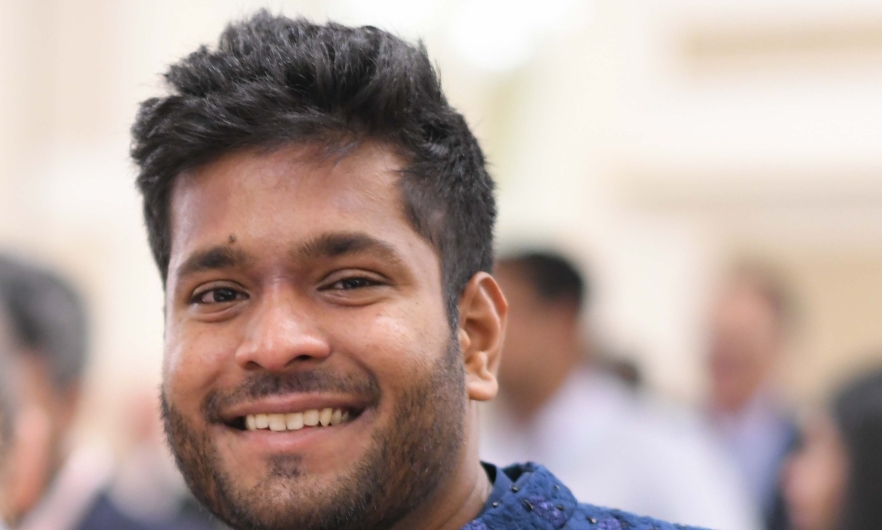Alumni Spotlight: Ishann Pathak, MSPH '21

- Degree Program: MSPH
- Area of Interest: Women's, Reproductive and Sexual Health
- Graduation Year: 2021
- Hometown: Tough one - Mumbai is the easiest answer...but home is where I am, and that's Atlanta right now.
- Previous Degree(s) Earned: BS in Electrical Engineering, UCLA
What sparked your interest in public health?
While I was at UCLA, I joined a student organization called Sexperts. We trained as peer sexual health educators to teach other students about safer sex, consent, and communication. While I joined on a whim, I came to truly appreciate the role of health education in broaching stigmatized subjects like sexuality, and the positive impact that was having on my life and the lives of those in my community. By the time I graduated, I was co-director of Sexperts and had contributed to so much wonderful programming on our campus. I tried working in the engineering industry, but my heart wasn't in it, and I knew I wanted to be in public health!
What led you to choose Bloomberg School of Public Health and join the Department of Population, Family and Reproductive Health?
Bloomberg and the PFRH department have always had a strong connection to South Asia, which was important to me as someone who would like to practice in my home country of India. Public health in general and sexual health in particular have to respond to rapidly changing cultural norms, and I wanted to be somewhere that responded by being on the cutting edge of research. While in the program, I was able to participate in the LITE study, one of the USA's first large scale studies on sexual health in trans women.
Public health in general and sexual health in particular have to respond to rapidly changing cultural norms, and I wanted to be somewhere that responded by being on the cutting edge of research.
How did your degree prepare you for current and future roles? What aspects of the PFRH degree program did you find most useful?
The MSPH program is so strong on methods training. I have tapped into all the skills I learned - from epi and biostats, to community health and mediation. I appreciate the amount of class projects that were designed to simulate real world work and getting to work collaboratively with my peers. I learned a lot from my research positions and practicum as well - the opportunity to collaborate with people in different countries was amazing and it helped to see behind the curtains on what grants and admin looked like.
Describe your current position and responsibilities in a way that will inform current and prospective students about career opportunities in your field.
I am an ORISE fellow working as a cardiovascular epidemiologist at the CDC. My primary work is researching the incidence and characteristics of different heart disease conditions and risk factors in the United States. I am currently working on hypertension control in younger adults and peripartum cardiomyopathy (PPCM) incidence and mortality. I use large datasets like NHANEs and NIS and R for my statistical work. As a researcher, my responsibilities include determining research that will be valuable to the CDC based on my division's objectives and gaps in the literature, drafting research proposals, and navigating the research team through our process. As junior researchers, it is expected that you will do most of the analytical work and document your process for replication.
How did you build your sense of community during your time as a PFRH student?
The 2020 Covid pandemic hit right as we were finishing our first year, and most of my cohort moved out of Baltimore. We like to imagine community as large social groups, but sometimes community is your one friend in town and his black lab that you take on walks. My time in Baltimore taught me to first focus on building meaningful relationships with a few people that value and reflect your energy, and then using these as the foundation to building community together.
What was your favorite thing about living in Baltimore while you were a student?
Patterson Park and the view over the harbor.
Do you have any advice for prospective students?
Working in public health is a constant struggle between your ideals and those of the state or funders that we are all beholden to. You learn to compromise on a lot if it means delivering life saving interventions to people - but don't compromise on your values. Take the time to talk to people in the organizations you are interested in and learn what their day-to-day activities look like. Explore what would feel meaningful to you as full time work. I loved doing community work until it became a job...then I started burning out. I'm a lot happier as a researcher who does community work on the side. There are so many different roles within the public health ecosystem don't be afraid to experiment a bit till you find what works for you.
